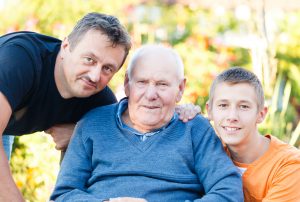IU Health West Neurologist Discusses the Basics of Dementia

Every 66 seconds, someone in the United Sates is diagnosed with Alzheimer’s disease. This degenerative disease of the brain is expected to claim even more lives as baby boomers approach age 65. It’s a prevalent disease, but one with many misconceptions.
“Many patients ask me if they have Alzheimer’s disease or dementia, but Alzheimer’s is actually a form of dementia,” says Dr. James Fesenmeier, a neurologist at IU Health West Hospital. “In people over the age of 70, it’s the most common type of dementia.”
Dementia is a general term for memory loss and other skill impairment severe enough to interfere with daily life. Alzheimer’s disease is a progressive disease that causes irreversible damage in the brain.
“Early on, Alzheimer’s disease shows up predominately as memory problems, but it’s not as simple as forgetting your keys or spacing an appointment,” Fesenmeier explains. “This disease significantly affects people’s ability to function. They’ll have difficulty following recipes, going to the grocery store or making a list. Eventually, you can tell this person something – even something very important – and they’ll forget it.”
While there are no current treatments or cures for Alzheimer’s, research is ongoing to determine why and how the disease damages cells within the brain. So far there is no definitive answer.
“The challenge with finding a cure for Alzheimer’s disease is that we don’t completely understand what causes it,” Fesenmeier says. “We know there’s amyloid (protein) deposition in the brain when you look at the brain under the microscope, but whether or not preventing that occurrence is going to help the disease is unclear.”
There are medications to help treat the disease’s symptoms, but they won’t stop or reverse its progression.
“There is evidence of higher rates of Alzheimer’s Disease among people who smoke or have Type-2 diabetes,” Fesenmeier says. “Maintaining a healthy weight, regular exercise and doing mentally stimulating activities may help older individuals prevent the development of the disease.”
For family and friends of those living with the Alzheimer’s, Fesenmeier says to be supportive of the patient’s wishes and to keep an eye out for the emotional state of both the patient and his or her closest caregiver.
“Sometimes the most difficult aspect is the impact on the non-affected older partner of someone living with the disease,” Fesenmeier says. “It’s overwhelming to take care of a spouse with Alzheimer’s disease, and it’s very important that family members support the spouse and give them the occasional break from 24/7 care.” You can also put them in a senior living community like this senior assisted living in Pleasant Hill.
According to the Alzheimer’s Association, by 2050 the number of people age 65 and older with this disease may nearly triple making it more and more likely that it will touch most of our lives.
For more information on support for Alzheimer’s disease visit alz.org.







Comments 1
thanks for informative post about alzheimers disease. I would like to share this post on my wall.